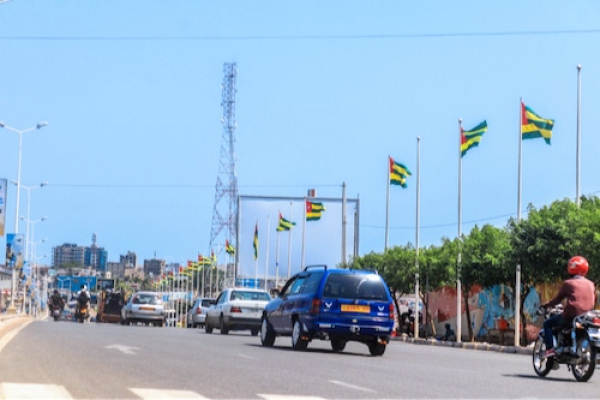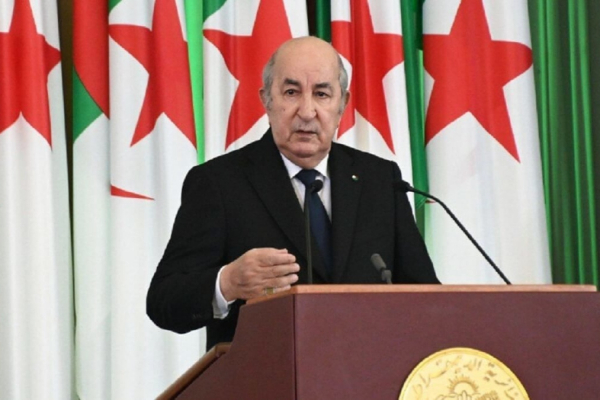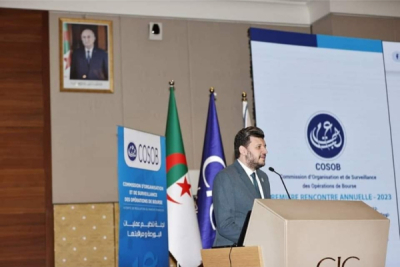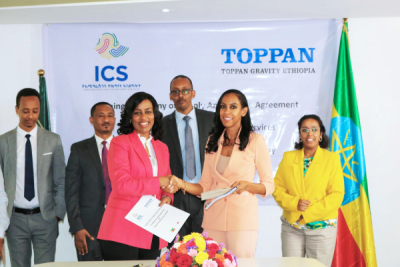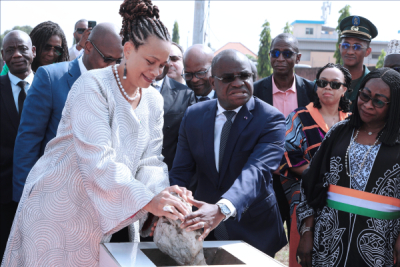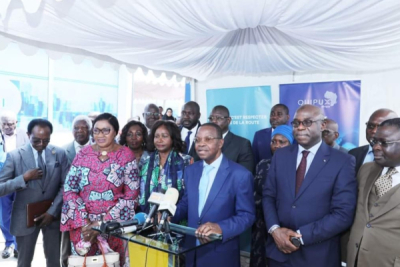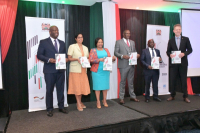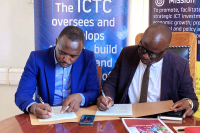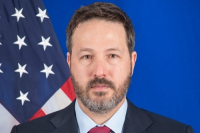
Public Management (603)
In a bid to enhance transparency, efficiency, and combat corruption, Togo has embarked on an ambitious digital transformation journey, focusing on key sectors like taxation. Following the lead of several African nations, the West African country aims to leverage technology to streamline administrative processes and improve resource traceability.
Togolese drivers can now ditch the queues and pay their motor vehicle tax (TVM) from the comfort of their smartphones, marking a new chapter in the country's digital tax revolution.
The Togolese Revenue Office (OTR) launched the online payment system on Tuesday, January 2, following its December announcement. The move streamlines tax compliance for vehicle owners, eliminating the need for time-consuming visits to physical offices. It also contributes to improving the level of tax collection and ensures greater transparency in operations.
The online TVM payment is part of a broader digitization push by the OTR to modernize tax administration and boost revenue. Several other services, including tax identification (NIF) acquisition, have already gone digital. Through the nif.otr.tg platform, Togolese citizens can now obtain their NIF, pay taxes and fees, register real estate, and access other services, all from their mobile phones.
According to recently published OTR figures, tax revenues have doubled in the past decade, soaring from XOF403 billion (around $673 million) in 2013 to XOF865 billion in 2022.
Samira Njoya
Algeria's ambitious drive to digitize its economy is starting to bear fruit, with key sectors experiencing tangible benefits from the government's focus on technological advancements.
Algeria is fast-tracking its journey towards a fully digitized government, with President Abdelmadjid Tebboune announcing the ambitious goal of "total dematerialization" of public services by mid-2024. The ambitious digital overhaul aims to simplify citizen interactions, streamline administrative processes, and reduce reliance on physical services.
In a landmark address to parliament on December 25, Tebboune outlined significant progress in digitizing key sectors, including national land registry, taxes, customs, healthcare, and digital identity. He declared, "By the end of 2024's first half, we will have definitively settled this question."
The push for digital transformation has gained momentum throughout 2023. Under Tebboune's directive, several initiatives have modernized crucial areas like education, where over 46 digital platforms for training and research were launched by the Ministry of Higher Education. Similarly, the labor, employment, and social security sector has seen numerous online platforms introduced, aiming to expedite service delivery and reduce the need for physical visits.
To spearhead these efforts, a High Commission for Digitization, led by Meriem Benmouloud, was established in September. This body is tasked with crafting the national digitization strategy and ensuring its effective implementation. Benmouloud confirmed that the strategy, currently under development, will be further bolstered by a dedicated law on digitization expected in the first quarter of 2024.
Samira Njoya
As Algeria embarks on a path of economic modernization, the North African nation is intensifying efforts to cultivate a vibrant ecosystem for innovative startups. This drive is poised to witness the proliferation of projects tackling social challenges with innovative technological solutions.
In a bid to fuel its fledgling startup ecosystem, Algeria has launched a dedicated crowdfunding platform, tapping into a global trend gaining traction.
The platform, launched on the sidelines of the first annual forum of the Algerian Securities Market Commission (COSOB), aims to bridge the gap between financial backers and aspiring entrepreneurs.
"This opens new doors for startups to access funding, broadening their options," said Yacine El-Mahdi Oualid (photo), Algeria's Minister of the Knowledge Economy, Startups, and Micro-enterprises.
The initiative dovetails with the government's broader thrust to expand financing avenues for innovative ventures. In October, a decree paved the way for crowdfunding activity in the country.
The platform is expected to empower companies with socially impactful projects to tap into a wider pool of investors through the digital platform.
Algeria is catching up with a rapidly surging global trend. Worldwide crowdfunding transactions ballooned from $1.5 billion in 2011 to $140 billion in 2022, with China leading the pack with a market size of $60-$100 billion. Africa, according to the World Bank, could see its crowdfunding market reach $2.5 billion by 2025.
Samira Njoya
As part of its digital transformation process, the Ethiopian government is investing in digital identification. The new project in that line is an e-passport initiative.
On Wednesday, December 13, the Ethiopian Immigration and Citizenship Services (ICS) and Toppan Gravity Ethiopia –a joint venture between Ethiopian Investment Holdings, Toppan Group, Berhanena Selam Printing Enterprise, and Educational Materials Production and Distribution Enterprise– officially signed a supply and services agreement to begin work on the new Ethiopian e-passport. The aim is to provide the country with a new, more secure travel document.
"This partnership marks a significant stride in modernizing Ethiopia's passport system, offering enhanced security features and improved efficiency," reads a tweet by the Immigration and Citizenship Services.
In recent years, Ethiopia has implemented several digital projects aimed at improving population identification. For instance, it set up the Fayda, a World Bank-supported program aimed at registering 90 million people by 2025. A similar program has also been set up to provide digital identification for 90,000 refugees and returnees on Ethiopian soil.
In a country that is immense in size and torn by internal conflicts between various ethnic groups, the introduction of the e-passport should significantly reduce the risk of identity forgery and fraud, thanks to additional levels of identity verification.
Adoni Conrad Quenum
According to the World Bank, the digital economy could generate more than $5.5 billion for Côte d'Ivoire by 2025, and more than $20 billion by 2050. However, seizing this golden opportunity requires immediate investment in critical infrastructure and initiatives.
Ibrahim Kalil Konaté (photo, center), Ivorian Minister for Digital Transition and Digitization, launched the construction of the next national data center in Abidjan on Thursday, December 14, in the presence of Jessica Davis Ba (photo, left), US Ambassador to Côte d'Ivoire. Certified Tier 3, the 2,200-terabit infrastructure will be built on a 20,000-square-meter site at the headquarters of the Radio Frequency Management Agency (AIGF) in Marcory-Anoumabo. The construction budget is $60 million.
"The National Data Center symbolizes our quest for digital sovereignty. It is designed to stimulate the dematerialization of administrative procedures, thus serving to modernize our public administration. As a catalyst for innovation, this Data Center will not only host the data of national administrative entities but also offer disaster recovery and business continuity solutions, thereby strengthening the resilience and security of our information systems," said the Minister.
The project aligns with the national digital development strategy, which was formally adopted in 2021. This comprehensive strategy, announced by Amadou Coulibaly, the then Minister for the Digital Economy, in June 2022, encompasses not only the construction of vital facilities but also the ambitious deployment of 7,000 kilometers of fiber optics by 2025.
Data centers are key to the ongoing digital transformation. African countries therefore need to invest in these infrastructures especially since the continent hosts only 2% of the global data centers, according to the International Telecommunication Union.
Adoni Conrad Quenum
The Ivorian government's 2021-2025 development plan unveils ambitious projects for economic and social growth. The projects require substantial financial resources. In that context, authorities are determined to clamp down on loopholes and collect every penny due.
Starting from January 2024, fines for road traffic offenses in Côte d'Ivoire will be processed through the Treasury platform, TrésorPay-TrésorMoney. Ibrahima Koné, the Managing Director of Quipux Afrique, the company overseeing the project, announced this development on Tuesday, December 12, during a visit by members of the Economic, Social, Environmental, and Cultural Council (CESEC) to the Integrated Management Center (CGI) in Treichville.
The platform, implemented by the Treasury and Public Accounting Department, is designed to enhance government revenue collection, ensure operational traceability, and provide immediate access to public funds to meet external support requirements.
This initiative is a key component of the Ivorian government's broader efforts to modernize public services and enhance services for the population. In practical terms, it involves the digitization of all funds collected by the Treasury and its branches, encompassing various fees such as school fees, school examination fees, communal taxes, fixed fines, contraventions, hospitalization fees, royalties, acts of justice, and other payments processed through Treasury departments.
Recent figures released by the National Treasury indicate that from January 2021 to June 10, 2023, over XOF30 billion ($50.2 million) was collected through the TrésorPay-TrésorMoney platform.
Samira NJOYA
The development of information and communication technologies fueled the growth of ecommerce across Africa, encouraging the multiplication of startups in the sector. In that context, to unlock the full potential of this economic engine, creating a robust legal framework becomes a critical and urgent need, ensuring both consumer protection and investor confidence.
On Wednesday, November 13, in Nairobi, Kenyan authorities, in collaboration with the German Agency for International Development Cooperation (GIZ) and the United Nations Conference on Trade and Development (UNCTAD), unveiled the country’s national e-commerce strategy. The primary goal is to enhance both domestic and cross-border trade, enabling local producers to respond to the international market.
"In the contemporary digital landscape, digital trade emerges as a gateway to commerce with a significantly low entry barrier. Notably, Kenya takes the lead among African nations, with its digital economy contributing a substantial 7.7% to the GDP. The newly launched Kenya National E-commerce Strategy aligns with our commitment to empowering local businesses and fostering economic growth from the ground up," explained Rebecca Miano, Kenya's Minister of Investment, Trade and Industry.
The launch is part of the government's strategy to make the country a leading technology hub on the continent and in the East African sub-region in particular. Startups operating in the e-commerce sector, such as Wasoko and Copia Global, have been able to emerge in the Kenyan ecosystem and will be able to continue their growth with the safeguards put in place by the public authorities to stimulate the sector's development.
Developing e-commerce-specific financing products; raising awareness of the need for documentation and collateral for financing; improving links between companies and financial institutions; and developing investment incentives are some of the objectives set by the country's authorities when rolling out the strategy.
Adoni Conrad Quenum
Following a successful partnership with a South African education technology startup last November, Tanzanian authorities are doubling down on their commitment to educational innovation by collaborating with a Ugandan firm.
On Tuesday, December 12, Ugandan technology firm HiPipo announced a partnership with the Tanzanian Information and Communication Technology Commission (TCIC) to accelerate financial and digital inclusion in the country. This collaboration will be powered by HiPipo's renowned "Include Everyone" program, aimed at fostering fintech innovation, empowering women in the sector, and attracting investments in the ICT industry.
"We are ecstatic to officially announce that a pivotal agreement has been signed and sealed between HiPipo and ICTC. This promising collaboration is aimed at expediting financial inclusion in Tanzania, under the renowned HiPipo Include Everyone Program, with the generous backing of the Bill & Melinda Gates Foundation," reads a post on the LinkedIn page of HiPipo’s CEO, Innocent Kawooya (photo, left).
“The Include Everyone program activities operated globally by HiPipo will play a crucial role in promoting financial inclusion, driving economic growth, fostering ICT investment, advising stakeholders, and building a resilient, knowledgeable group of Digital Innovation and ICT Professionals in Tanzania,” the post continues.
While lagging behind some regional counterparts like Kenya and Rwanda in digital advancement, Tanzania has recently embarked on a journey to bridge the gap. It has multiplied partnerships with various countries, organizations, and startups to accelerate its digital transformation. Earlier this month, authorities announced the upcoming launch, in 2024, of a national framework for the digital economy. In the education sector, the country has also teamed up with South African startup Snapplify to improve the availability and quality of educational resources for students in Tanzania over the next three years.
Adoni Conrad Quenum
The digitization of the healthcare sector is now essential to facilitate patient care and increase efficiency. With the significant resources required for this transformation, African countries are increasingly seeking strategic partnerships to support their digitalization efforts.
American bilateral aid agency The Millennium Challenge Corporation (MCC) announced, last Monday, its commitment to assisting Lesotho in establishing a national digital health system. This initiative, commencing in early 2024, aims to significantly improve the nation's ability to track and manage the health of its citizens, particularly those affected by HIV/AIDS, malaria, and tuberculosis.
"MCC will be making major investments in primary health care equipment and digital health infrastructure, beginning in early 2024. We are also planning for a health data and innovation incubator to create public demand for quality health data. [...] MCC is planning to work with the Ministry of Health to design and implement a fully operational digital health system, across all disease areas, building from the foundation established by PEPFAR– President’s Emergency Fund for AIDs Relief," explains the MCC in a blog post.
The digitization of Lesotho's national health system is a direct outcome of the effective digitization of data from the PEPFAR project. Launched in 2003 and reauthorized in 2018, this initiative received financial backing from both the United States and the Global Fund to End AIDS, Tuberculosis, and Malaria. Originally designed to cater uniquely to pregnant women with HIV, PEPFAR has significantly enhanced clinical monitoring capabilities, facilitating real-time updates of crucial data.
Adoni Conrad Quenum
Artificial intelligence (AI) is rapidly becoming an integral tool across diverse domains, including the military. Military forces are actively exploring and implementing AI solutions to enhance their capabilities and operational effectiveness in various areas.
The United States commits to supporting Nigeria's use of artificial intelligence (AI) in the fight against terrorism within its borders. The support was announced during a press conference held in Abuja, Nigeria, on December 7th by Paul Dean, Principal Deputy Assistant Secretary of the US Office of Arms Control, Deterrence and Stability.
"We want to encourage the positive applications of artificial intelligence in the military. This initiative we launched with our partners just last month is centered around achieving just that: maximizing the tremendous value of artificial intelligence in military applications [While] at the same time, ensuring the international community has coalesced around a series of norms of responsible behavior to make sure that we are reducing the risk of unintended consequences or negative applications," said Paul Dean.
This US commitment comes at a critical juncture for the Nigerian military. Recent criticisms have arisen following a drone strike in Kaduna State that resulted in the deaths of approximately 100 civilians. While acknowledging the need for safeguards surrounding AI deployment in the military sector, the US views itself as a crucial ally for Nigeria in its counter-terrorism efforts. To this end, it is essential to support the use of AI, which could have prevented the obvious error in the Kaduna State tragedy. In the north of the country, Abuja has been facing several terrorist groups, particularly Boko Haram, for many years.
"...We are convinced that when states commit themselves to using this technology in a predictable, transparent, stable, and responsible way, the international community will be in the position of maximizing the advantages while reducing the risks of an irresponsible approach," the U.S. official added.
Adoni Conrad Quenum
More...
The COVID-19 pandemic accelerated the adoption of e-learning platforms, and their usage has continued to rise since. Recognizing the effectiveness of this approach, the Tunisian government has embraced e-learning platforms as a key tool for training its civil servants.
Nizar Ben Néji (photo, center), Tunisia's Minister of Communication Technologies, inaugurated the "Digital Learning Academy" platform on Friday, December 1. The primary goal is to provide 680,000 civil servants with access to online training courses to enhance their digital skills.
The initiative, spearheaded by the Ministry of Communication Technologies, is overseen by Smart Tunisian Technoparks, a Tunisian technopark specializing in information and communication technologies.
The launch of the Digital Learning Academy aligns with Tunisia's comprehensive digital strategy, set to be fully implemented by 2025. This strategy prioritizes the digitization and simplification of administrative procedures alongside the development of enhanced digital services for citizens. To effectively implement these objectives, government employees must adapt to evolving digital standards and embrace new technologies. The Digital Learning Academy addresses this need by providing civil servants with access to a comprehensive range of free, internationally certified online training courses, fostering a more digitally skilled and adaptable workforce.
Adoni Conrad Quenum
Despite the continent's booming startup scene, only a handful of countries –Tunisia, Congo, and Nigeria– have legal frameworks specifically designed to support and nurture local startups. Kenya, with its vibrant tech hub, aims to join this exclusive club in 2024 by enacting its own Startup Act.
Kenya's Startup Bill, which has been in the Senate since 2021, will be enacted in 2024, President William Ruto (Photo, left) announced at the Kenya Innovation Week (KIW) last week. This landmark legislation promises to be a game-changer for Kenyan innovators, offering them not only a supportive legal framework but also tangible benefits and a dedicated platform to access various resources.
“By March, or April next year, we will have a firm startup law in Kenya, which will assist many of our innovators to de-risk their innovations and turn them into businesses," said President Ruto.
Despite lacking such a framework, Kenya's tech ecosystem has consistently attracted most of the investments in Africa in recent years, along with Nigeria, South Africa, and Egypt. According to Disrupt Africa’s "The African Tech Startups Funding Report 2022”, Kenyan startups captured $574.8 million in investments in 2022, $292 million in 2021, and $191.4 million in 2020. This bill is expected to further enhance Kenya's attractiveness, create jobs and wealth, and connect research institutes with businesses.
Adoni Conrad Quenum
Nigeria has one of the most mature technology ecosystems in Africa. To further bolster the attractiveness of this ecosystem, the Nigerian government is forging strategic partnerships with key players in the industry.
On Wednesday, November 29, the African Development Bank (AfDB) announced the approval of an $80 million loan for the Ekiti Knowledge Zone (EKZ) incubation program. The funds will be used to build a 20-hectare green technology park and service infrastructure such as roads, electricity, water supply and wastewater treatment facilities. The Ekiti State Government will finance the project to the tune of $14.8 million, with a total project cost of $94.8 million.
"The Ekiti Knowledge Zone Project design responds to the requirements of technology firms and prospective investors as indicated during the preparation phase, lessons learned from similar Bank-financed projects such as the Cabo Verde and Senegal technology parks, and drew insights from good practices of similar initiatives in the continent and globally," said Lamin Barrow, AfDB’s Director General of Nigeria Country Department.
The EKZ incubation program aims to provide an enabling environment for research and development, information and communication technologies, incubation, and acceleration of technology startups, as well as pre-seed and seed financing. The goal is to transform EKZ into a major technology hub that could create some 26,000 jobs and generate net economic benefits worth $14 million a year.
In April 2023, the federal government granted EKZ "free zone" status, which will enable private investors to benefit from various advantages such as the free repatriation of capital, profits, and dividends by foreign investors; free land during the construction phase; tax exemptions; import and export duty waivers; and expatriate quotas for companies operating locally.
"This funding will play a crucial role in realizing our vision for EKZ [...] EKZ is not just about buildings; it’s about building communities, generating thousands of jobs, including opportunities for women and youth, while fuelling the State’s progress," said Akintunde Oyebode, Ekiti State Commissioner for Finance.
Adoni Conrad Quenum
African countries are actively forging strategic partnerships to remain abreast of the swiftly evolving global technological landscape. In the same vein, Morocco recently inked a memorandum of understanding with a U.S. Tech giant.
On Monday, November 27, Morocco's Ministries of Higher Education and Digital Transition signed a memorandum of understanding (MoU) with American technology giant Oracle, marking a significant step towards enhancing digital skills development in the kingdom's higher education landscape.
The MoU aims to empower professors and students with access to comprehensive training programs, learning resources, and software developed by Oracle. This collaboration aligns with the Kingdom of Morocco's ambitious digital transformation goals, as outlined in its digital transformation strategy, Maroc Digital.
"This memorandum of understanding forms part of the Ministry of Digital Transition and Administrative Reform's vision to increase the number of skills and talents trained in digitalization professions. [...] This will enable us to support our country's digital transformation as a leading producer of digital solutions at regional and continental levels, while also meeting the needs of national and international investors," reads a joint release from both ministries.
Under the terms of the MoU, Oracle will provide Moroccan institutions with access to its Oracle Academy, a global education program that has been empowering students for over two decades. Through this partnership, Moroccan students will gain hands-on experience with Oracle's technology stack, preparing them for successful careers in the digital sector.
The MoU aligns with Morocco's commitment to Maroc Digital, which calls for the annual training of 45,000 digital talents and the conversion of 50,000 young people to digital professions. This initiative aims to position Morocco as a global hub for innovation and digital excellence.
On completion of the training courses, Moroccan students will be able to obtain Oracle professional certifications in various technological fields, enhancing their career prospects and making them highly sought-after professionals.
Adoni Conrad Quenum


